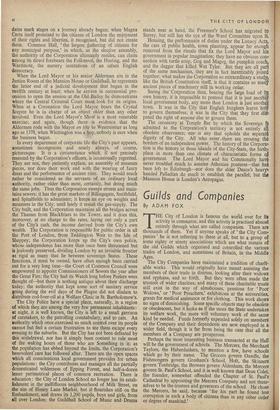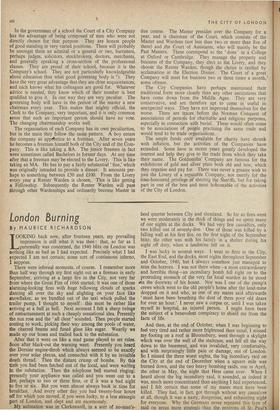Guilds and Companies
By ADAM FOX THE City of London is famous the woad over for its activity in commerce, and this activity is practised almost entirely through what are called companies. There are thousands of them. Yet if anyone speaks of 'the City Corn' panies ' he is not referring to these at all, but to a group of some eighty or ninety associations which are what remain of the old Guilds which organised and controlled the various trades of London, and sometimes of Britain, in the Middle Ages.
The City Companies have maintained a tradition of charit- able works. This would originally have meant assisting the members of their trade in distress, looking after their widows and orphans, and so forth. But they were often made the trustees of wider charities, and many of these charitable trusts still exist in the way of almshouses, pensions for 'Poor Widows,' or 'Poor Preachers,' exhibitions at the universities, grants for medical assistance or for clothing. This work shows no signs of 'diminishing. Some specific objects may be obsolete or obsolescent, but it looks as if the more the State undertakes its welfare work, the more will voluntary work of the same kind be needed. Funds formerly expended solely on members of the Company and their dependents are now employed in a wider field, though it is far from being the case that all the members of a Company are prosperous.
Perhaps the most interesting business transacted at the Hall will be the government.of schools. The Mercers, the Merchant Taylors, the Haberdashers, to Mention a few, have schools which go by their name. The Grocers govern Oundle, the Fishmongers govern Gresham's School, Holt, the Skinners govern Tonbridge, the Brewers govern Aldenham, the Mercers govern St. Paul's School, and it is well known that Dean Colet, the founder, somewhat offended the Chapter of St. Paul's Cathedral by appointing the Mercers Company and not them- selves to be the trustees and governors of the school. He chose the Mercers, he said, because 'for his part he found less corruption in such a body of citizens than in any other order or degree of mankind.' . In the government of a school the Court of a City Company has the advantage of being composed of men who were not directly chosen for that purpose. They are honest people of good standing in very varied positions. There will probably be amongst them an admiral or a general or two, barristers, perhaps judges, solicitors, stockbroker, doctors, merchants, and generally speaking a eross-section of the professional classes. They are proud of their school, because it is the Company's school. They are not particularly knowledgeable about education (but what good governing body is ?). They have the very great advantage that they are close acquaintances, and each knows what his colleagues are good for. Whatever advice is needed, they know which of their number is best qualified to give it. In one 'way they are very peculiar. The governing body will have in the person of the master a new chairman every year. This makes that mighty official, the Clerk to the Company, very important, and it is only common sense that such an important person should have no vote. The changing chairmanship works well.
The organisation of each Company has its own peculiarities, but in the main they follow the same pattern. A boy enters the company as appitntice to a freeman. After seven years he becomes a freeman himself both of the City and of the Com- pany. This is like taking a BA. The junior freemen in fact were sometimes called Bachelors in former days. At any time after that a freeman may be-elected to the Livery. This is like taking an MA. He has to pay a fairly substantial 'fine,' which was originally intended to provide a dinner. It amounts per- haps to something between £50 and £100. From the Livery every year a Renter Warden is chosen. This is like getting a Fellowship. Subsequently the Renter Warden will pass through other Wardenships and ordinarily become Master in due course. The Master presides over the Company for a year, and is chairman of the Court, which consists of the Master and Wardens (not less than two or more than five of them) and ithe Court of Assistants, who will mainly be the Past Masters. These correspond to the 'dons' in a College at Oxford or Cambridge. They manage the property and business of the Company, they elect to the Livery, and they choose the Renter Warden, though the choice is ratified by acclamation at the Election Dinner. The Court of a great Company will meet for business two or three times a month.' some oftener.
The City Companies have perhaps maintained their traditional form more closely than any other institutions that have come down from the Middle Ages. They are very conservative, and are therefore apt to come in useful in unexpected ways. They have not improved themselves for the worse. There are traces before the Norman Conquest of associations of persons for charitable and religious purposes, especially in connection with burial. These would often come to be associations of people practising the same trade and would tend to be trade organisations.
The ample funds once available for charity have shrunk with inflation, but the activities of the Companies have extended. Some have in recent years greatly developed the interest and help they give to the trade from which they take their name. The Goldsmiths' Company are famous for the exhibitions of gold and silver plate both old and new, which they organise and pay for. There was never a greater wish to join the Livery of a reputable Company, not merely fo? the time-honoured_ privilege of electing the Sheriffs, but for taking part in one of the best and most honourable of the activities of the City of London.



































































 Previous page
Previous page